T&BB report from Busworld Turkey 2024
By Bradley Osborne - 16th July 2024
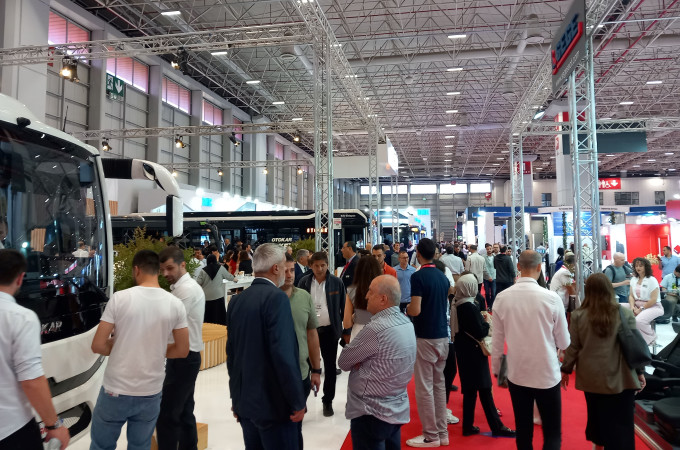
Busworld Turkey 2024 showfloor
Turkey – National vehicle shows are often like a sheet of glass which is transparent on one side and opaque on the other: in some cases, the foreign visitor has translation issues and cannot understand what is going on; in others, the domestic companies wait eagerly to receive overseas delegates who, in the end, don’t turn up. In a market like Turkey, it is crucial that domestic and international attendees are able to communicate with one another. One the one hand, Turkey is a giant market with growing infrastructure and, therefore, growing demand for goods and passenger transportation. On the other hand, it has long been a prime location for offshore manufacturing, especially for the European automotive industry. At a show like Busworld Turkey, then, companies who are interested in growing their share of the domestic market and companies who are interested in exporting products from Turkey are represented in equal proportions. Indeed, many of Turkey’s major bus manufacturers and suppliers are keen to secure market leadership both at home and abroad – that is to say, in Europe chiefly.
At Busworld Turkey 2024, many of the country’s major suppliers of bus interiors – seats, windows, panelling, and so on – were in attendance. One company I spoke to was Farhym, a producer of interior components working with fabrics, plastics, aluminium, and other materials. The vast majority of its output goes to German manufacturer MAN, which builds buses in Turkey. Bülent Akgöl, CEO of Farhym, told T&BB that the company began as a joint venture in 2003 between Turkish and German partners in order to supply to MAN. It remains part of the Hymer-Leichmetallbau group, a metal processor based in Germany. Early on, Farhym expanded its output to serve Turkish OEMs in addition to MAN: its customers have included Temsa, Karsan, and Akia. All might seem well from the outside, but Akgöl complained of financial issues related to the weakness of the national currency, the lira. The decline in the domestic economy was a recurring theme in our conversations during the show, and established companies such as Farhym are keen to find foreign customers and external sources of investment.
Many of the companies present at the show, however, were not Turkish but Chinese. This apparently reflects a twofold interest: one, to foster Turkey as a market for Chinese exports; the other, to use Turkey as a bridge to Europe. Some of my impressions from conversations with Chinese suppliers present at the show are printed towards the end of this report.
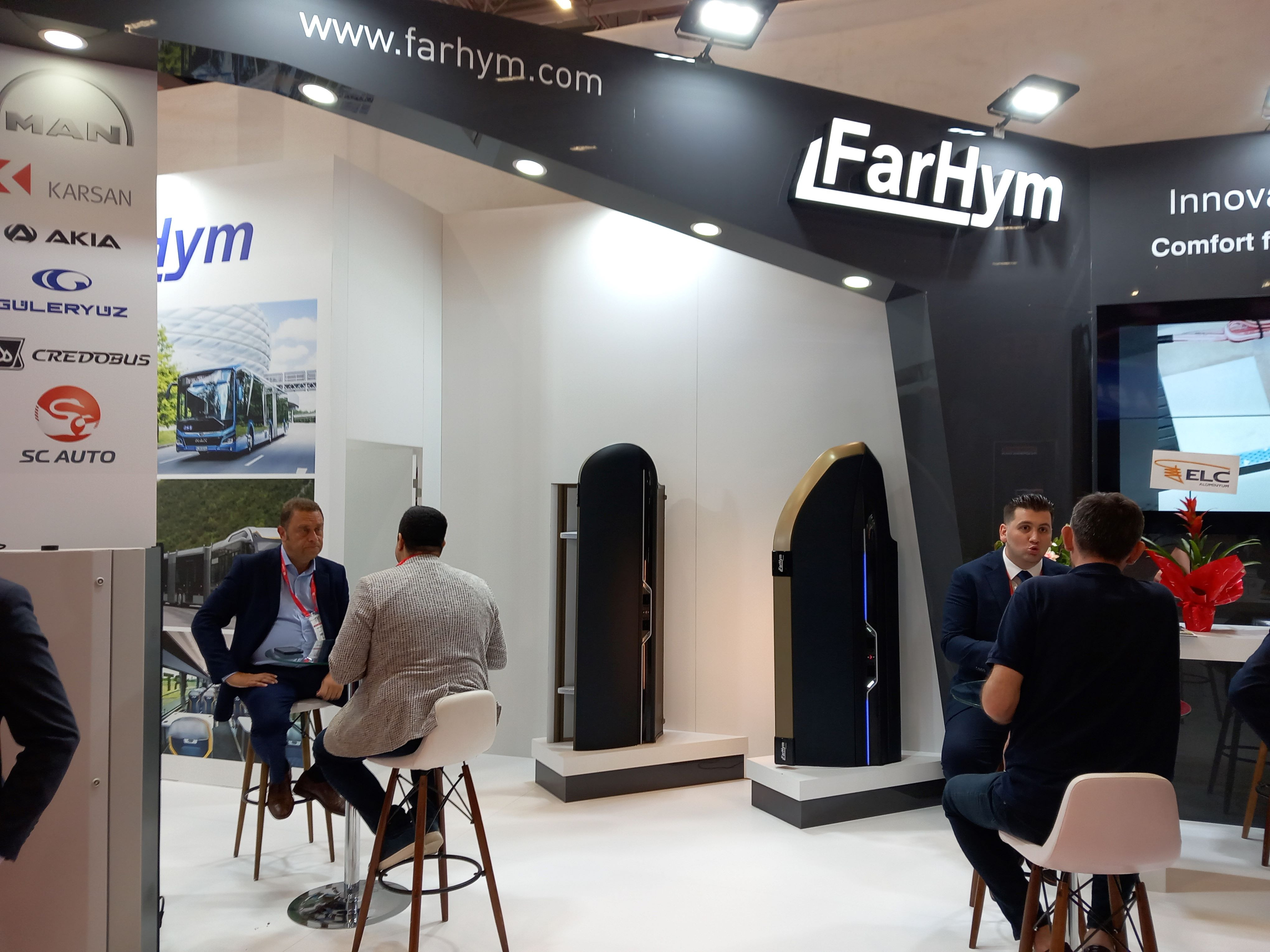
Farhym stand
Turkish OEMs at the show
Otokar of Sakarya presented several vehicles, two of which were “refreshed” iterations of existing ranges: a new ‘e-Kent’ city bus and a new ‘Sultan Giga’ (called ‘Navigo’ in Europe) coach. The e-Kent now boasts a range of up to 550 kilometres.1 The Sultan Giga has had an exterior and interior facelift and features new ADAS equipment for compliance with the EU’s latest General Safety Regulation. Both vehicles come equipped with Otokar’s telematics system, ‘Bus Monitor’, as standard.
The company is reportedly carrying out research and development work on vehicle lightweighting for its low- and zero-emission tailpipe buses and coaches. Moreover, it showed for the second time its ‘Otonom e-Centro’, a self-driving bus with technology developed in-house which was first demonstrated at Busworld Europe 2023
Habaş of Istanbul, a relative newcomer to the bus industry, displayed three buses at the show: the ‘AlfaLux-2’ two-door 8.2-metre midi electric coach for 35 seated passengers; the ‘ComfortCity-e’ 3-door low floor battery electric city bus (these two were first displayed at Busworld Europe); and a world premiere, the hydrogen fuel cell version of the 12-metre ComfortCity city bus.
Representatives at the company said that the aforesaid first two vehicles were now fully homologated for Turkey and countries within the EU, and all three vehicles were set to go into production towards the second half of next year at a brand new purpose-built factory in Manisa for bus and truck manufacture. The company said it said it had already started construction of the factory and that start of production was scheduled for the late second half of 2025.
Towards the end of next year, Habas plans to focus on sales of its commercial vehicles to the Turkish market, and thereafter focus on sales to the Middle East and Eastern European countries.
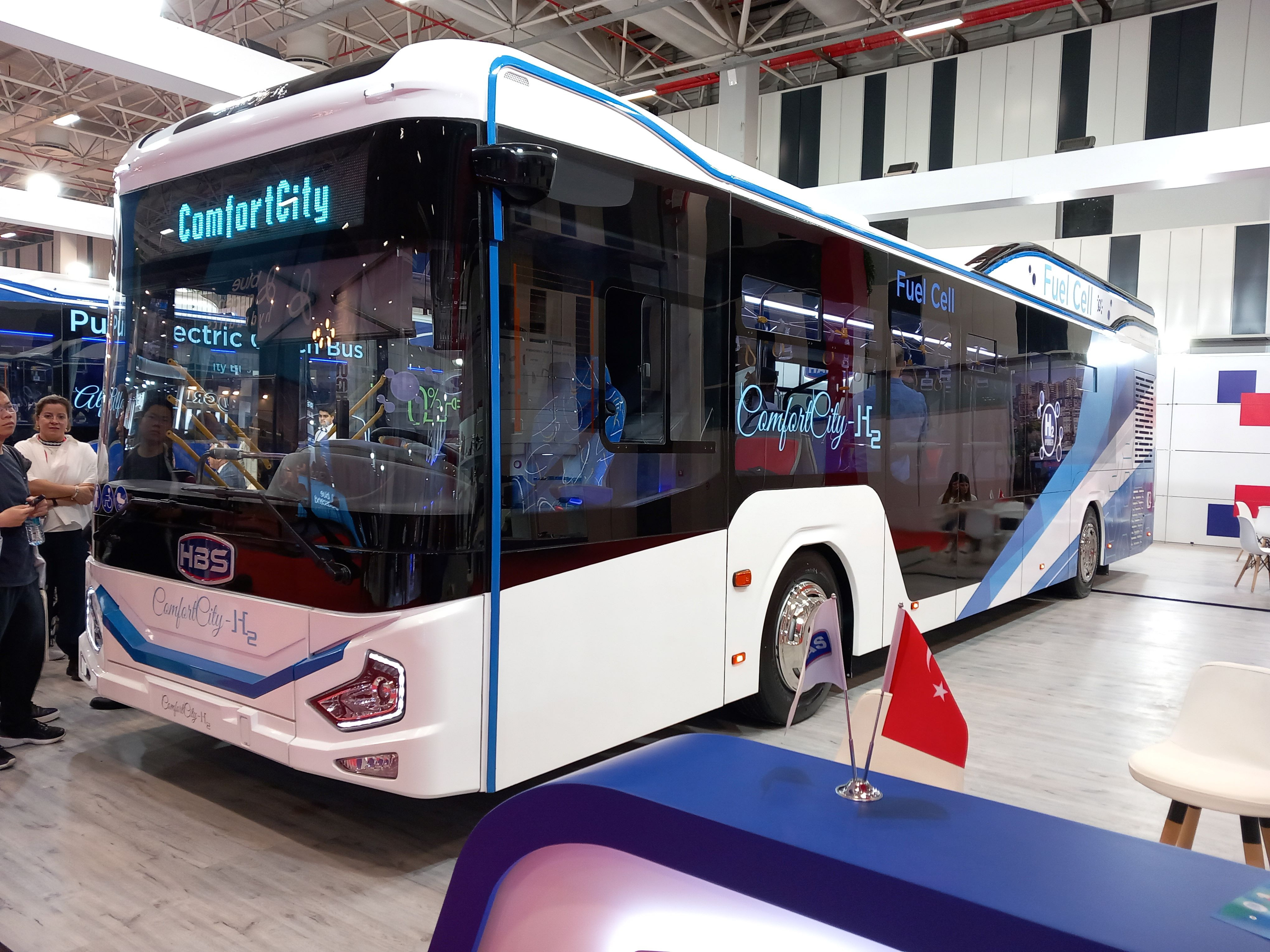
Comfort City H2 by Habas
Bozankaya of Ankara – known primarily as a manufacturer of rolling stock and trolleybuses – presented a prototype battery electric bus for urban applications. The vehicle displayed was a 12-metre model with a low floor and a wheelchair ramp. The company said it would offer the bus in sizes between 10 and 25 metres. It is one of four prototypes which the company has built to test different battery chemistries.
Bozankaya’s presentation of the vehicle was scant on details; instead, the company emphasised its extensive experience in rail and trolleybus manufacturing. It owns a 100,000-square-metre production facility where it builds all its products, including some of the electrical componentry: at the company stand, it displayed electronic control and multi-functional units, a 12-cell balancing monitoring unit, and a battery control unit. Such systems, designed originally for its rolling stock and trolleybuses, are readily adaptable to city buses. The company also has some limited experience already in bus production: it began making bus carbodies and underframes in 2003 and, in 2014, built its first electric bus (several of which are on the road in Turkey).2
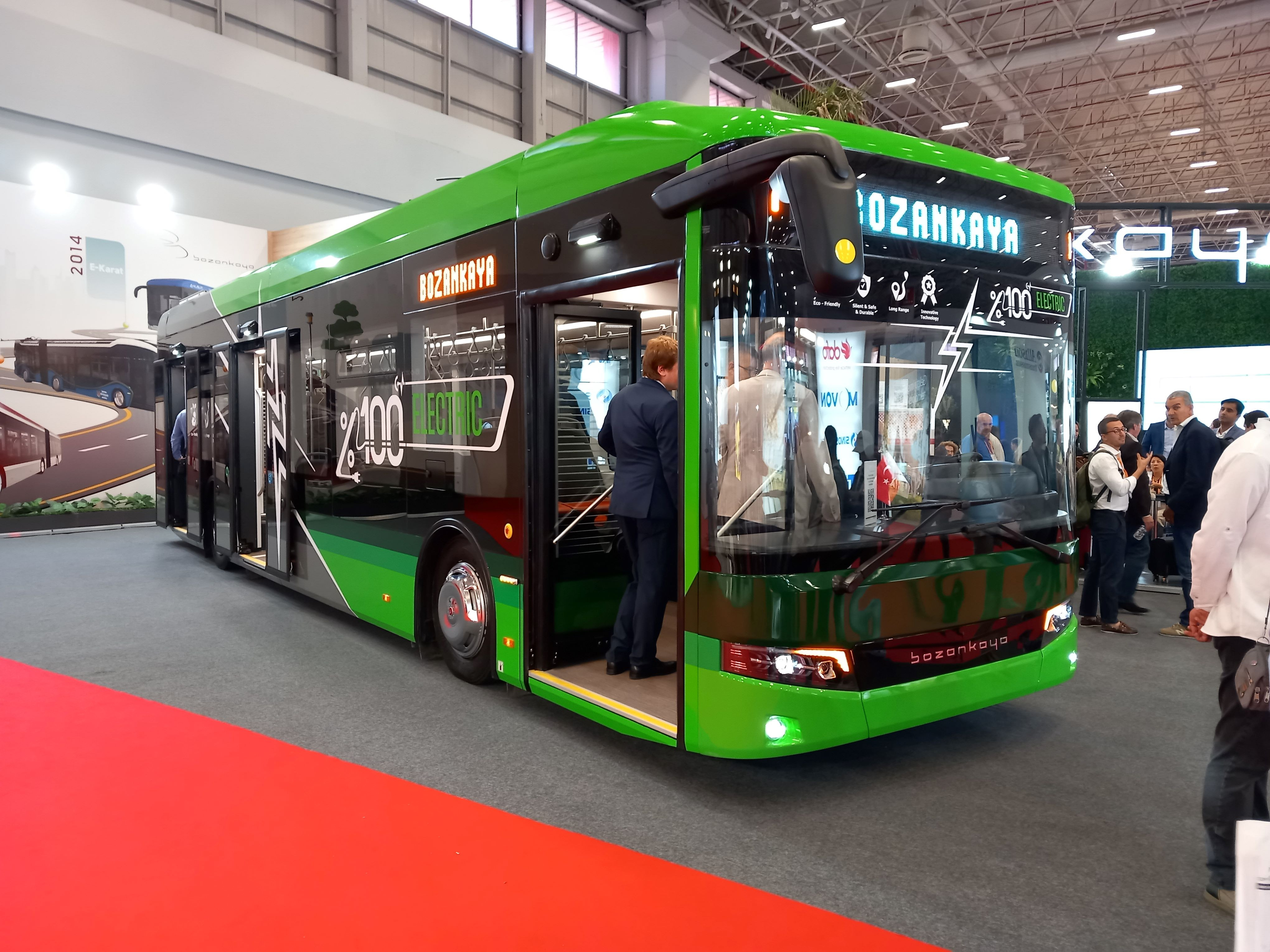
Bozankaya 12-metre bus
BMC of Izmir displayed four buses: two ‘Procity’ 12-metre buses (one battery electric) and two ‘Neocity’ 8-metre buses (one battery electric, the other a ‘VIP’ model). Its battery supplier, Accelera – a Cummins brand – showcased its latest NMC (nickel manganese cobalt) battery pack, the BP97E. Cummins signed a Letter of Intent in early May to supply batteries to BMC; Cummins said that this is the first time the BP97E battery pack would be used in operation in Europe.
Each BP97E pack stores up to 97 kWh; with a six-pack configuration, an electric bus can carry up to 582 kWh of energy. The project to power BMC’s electric buses is already underway, with the BP97E batteries expected to be delivered in 2024 and buses delivered to customers in 2025.
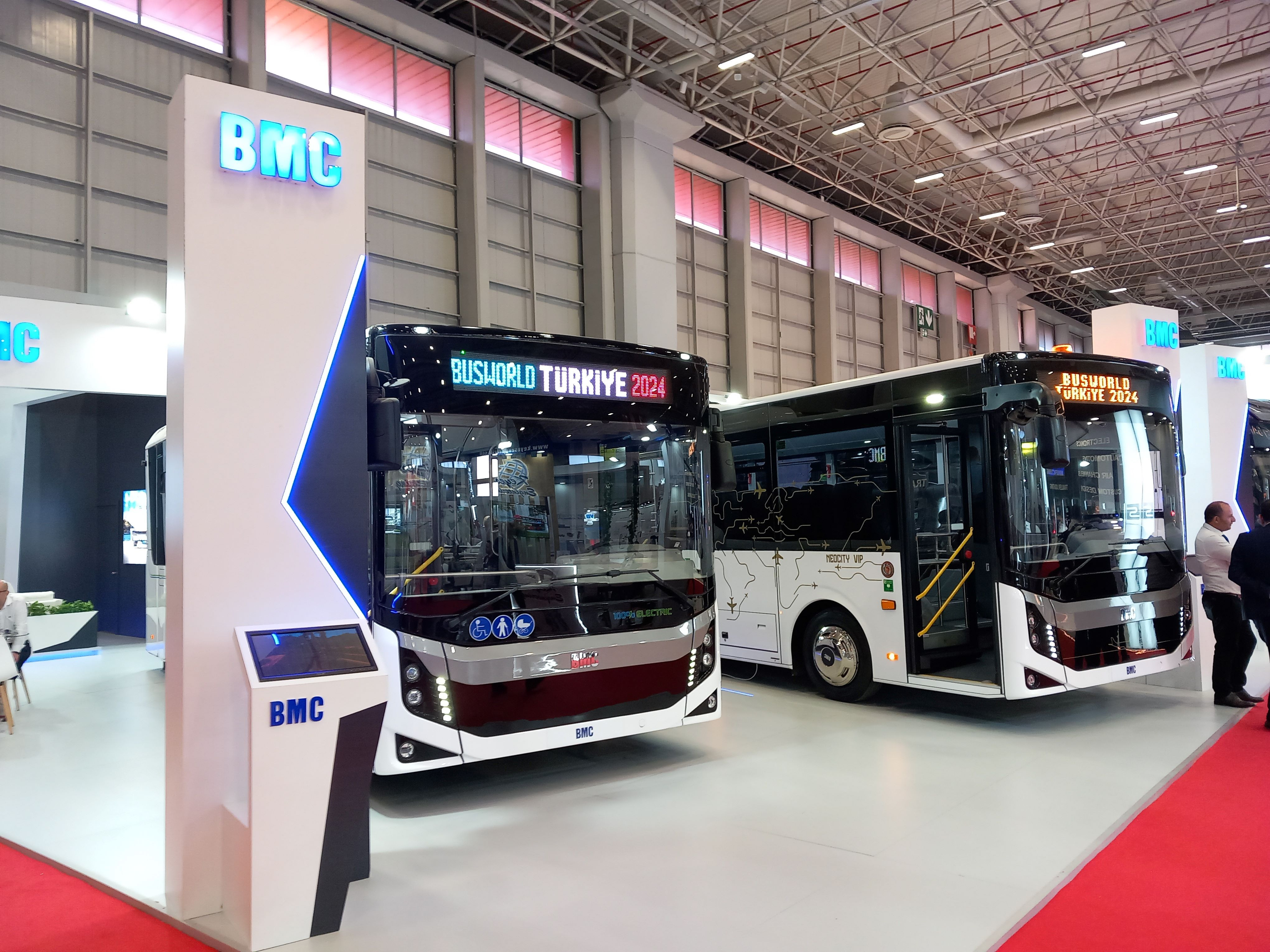
BMC stand
Iveco Bus of France was one of two foreign bus manufacturers to present vehicles at the show. The company unveiled an ‘Evadys’ coach decorated with the livery of the Turkish Olympic team, promoting a partnership with the Turkish National Olympic Committee which was formalised on 31 May. The Evadys will be used over the next two years to transport Turkish athletes for Olympic events and training.
Marco Franza, head of Iveco Bus commercial operations in Asia, and Gauthier Ricord, head of commercial operations for Africa and the Middle East, told T&BB that Georgia, Azerbaijan, and (potentially) Thailand, in addition to Turkey, are key markets of interest for the company. Two years ago, the company established dedicated teams for the world’s markets, splitting the globe into four regions (Europe; Americas; Asia (inc. Oceania); Africa & Middle East). All Iveco buses sold to the Asian and African markets are exported from its French and Czech plants, except for Vietnam, where the company has an arrangement with Thaco to assemble complete knockdown buses locally.
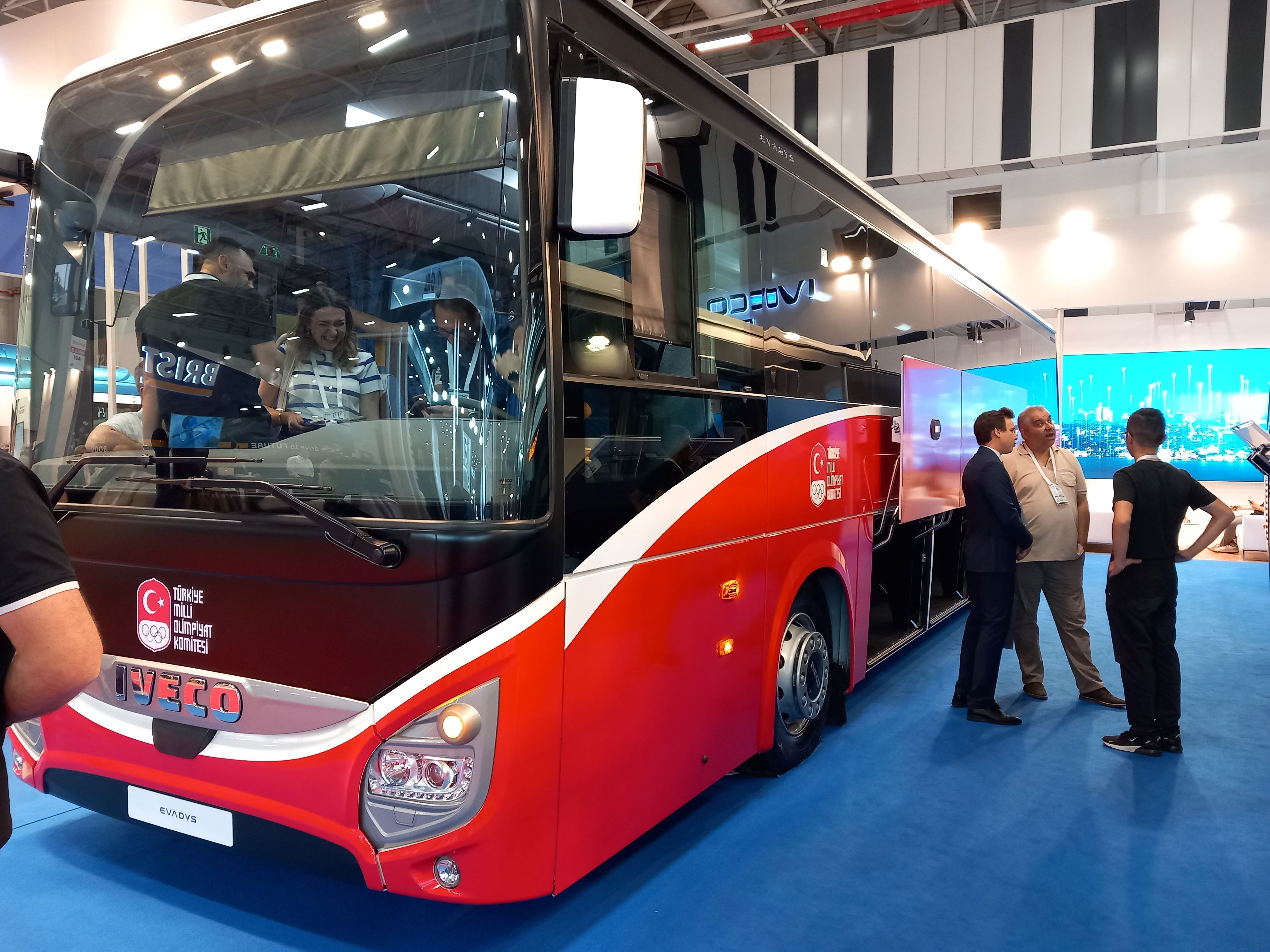
Iveco Evadys for Turkish Olympic team
Some European suppliers at the show
German automotive systems supplier ZF – a major partner to the Turkish bus industry – used this edition of Busworld Turkey to present its latest electric portal axle for low-floor buses, the ‘AxTrax 2 LF’ – marking its debut in Turkey. Alongside the AxTrax 2 LF, ZF presented its ADAS suite – including sensors and ECUs – its ‘OnHand’ electro-pneumatic handbrake, its ‘OptiTire’ tyre pressure monitoring system, its digital tachograph, and the ZF ‘Bus Connect’ telematics platform.
Sound insulation and sound dampening products engineering company, Cellofoam (Cellofoam International GmbH & Co. KG) of Biberach, Germany was at the show to display an ‘engine’ sound insulation jacket for electric motors to reduce the noise level. Despite electric motors being distinctly quieter than the internal combustion engine, they can emit a certain whine or tone that at certain frequencies (rate at which current changes direction per second (Hz)) is unpleasant to human hearing.
Joachim Born, senior key account manager, Cellofoam, explained at the show that it is for tonalities or Hz frequencies between 2,500 and 3,150 Hz that it has developed its engine (electric motor) jacket, called the Cello 840 V3 VL, as an efficient way of reducing the unpleasant noise level. The Cello 840 V3 VL consists of a compacted polyester non-woven fleece, which is protected from moisture on both sides by a hydrophobic black cover fleece, provides good sound-absorption and sound-insulation properties, while being optimized in terms of weight.
Industria Arcol SA of Barcelona, Spain, promoted its eMirror, details of which can be found on this link, emirror.
Roberto Garcia, area manager at Arcol, said at the show that the eMirror was officially launched in 2023 and had been displayed for the first time at Busworld Europe last October. The launch coincided with the company’s 80th anniversary year of manufacturing mirrors for the CV industry. Garcia explained that Arcol had spent five years developing the eMirror, stating that the digital mirror offers a host of advantages to conventional mirrors, including reduced weight and greater visibility with reduced blind spots. The eMirror is homologated already for the coaches and trucks in European Union regulations, and Garcia announced that the company is now working on the systems’ homologation for vehicle applications in the USA and Canada by the end of 2025.
Some Chinese companies at the show
The other foreign bus manufacturer present at the show was CRRC Corporation Ltd, a Beijing-based firm which, like Bozankaya, is best known as producer of rolling stock. It displayed a 12-metre battery electric bus for urban applications. The bus is powered by a motor developed in-house, with peak power of 240 kW and maximum torque of 3,200 Nm. The onboard batteries store up to 350 kWh.
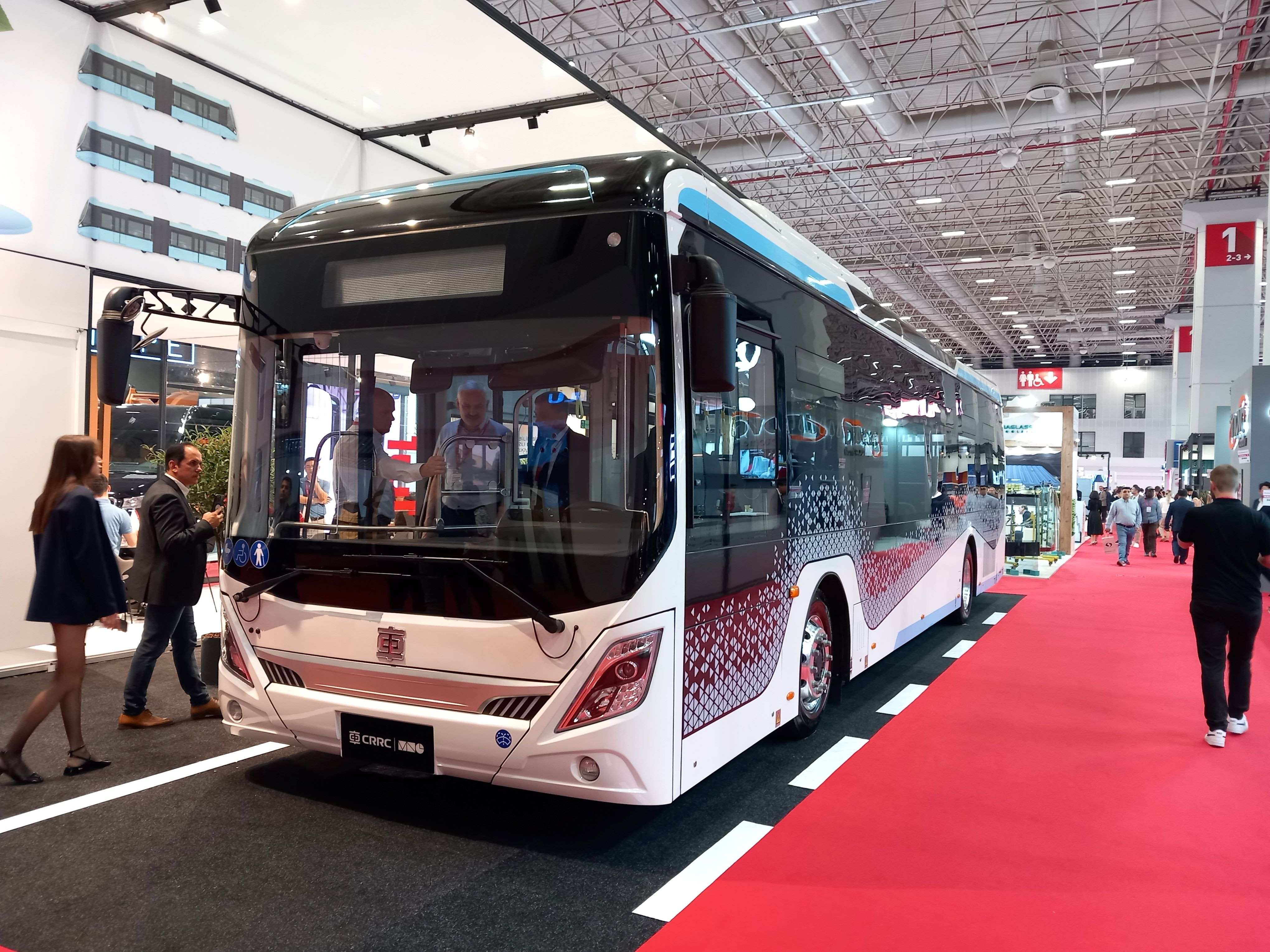
12-metre electric bus by CRRC
Though CRRC cut a lone figure among the domestic manufacturers, there were many Chinese component suppliers dotted around the exhibition. Whereas the Turkish suppliers tend towards commodity production, the Chinese presented examples of their highly technical powertrain components and digital equipment (primarily ADAS).
Presenting examples of the former was Shaanxi HanDe Axle Co Ltd (“HanDe Axle”) of Xi’an, partly owned by Weichai Power. It displayed two electric drive axles – one which was conventional, the other of which was a portal axle for low-floor buses. These are produced in China for the domestic market and for export across the world. A spokesman told T&BB that the company’s production capacity for both electric and traditional axles was 1.5 million in total.
One company which supplies ADAS to the European market is Guangzhou Rongsheng Technology Co Ltd (“Rongsheng”), a producer of mirror cameras for commercial vehicles. Rongsheng’s mirror camera system also monitors the vehicle blind spots in front of and around the vehicle, alerting the driver visually and aurally when pedestrians and other road users get too close to the truck or bus. It supplies these systems to a long list of Chinese OEMs, but it is relatively new to the European market (since 2023) and is now hoping to find customers in Turkey as well.
Another company I spoke to was Streamax Technology Co Ltd of Shenzhen which specialises in image processing and perception for commercial vehicles. Similarly to Rongsheng, Streamax supplies a system which can detect pedestrians and other road users who are in close proximity to the vehicle. Streamax has been present in the Turkish market for eight years and counts Otokar among its customers. A spokesman told T&BB that the company’s purpose at the show was to demonstrate its technological compliance with the latest EU regulations. Its system can now provide speed limit alerts and monitor driver attentiveness; customers may choose the kind of feedback they would like, i.e., visual, aural, and/or haptic. Streamax produces its systems in China and ships them directly to Europe and Turkey. It will send engineers to aid OEMs in integrating the system with the vehicle.
1 In 2021, Otokar advertised a range of up to 300 kilometres for the ‘e-Kent C’; see our article from September 2021: https://truckandbusbuilder.com/article/2021/09/06/otokar-releases-all-electric-city-bus-with-voith-veds-and-webasto-batteries
2 Bozankaya’s past electric bus models were called ‘E-Karat’ (2014) and ‘Sileo’ (2017).



